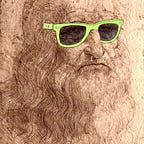The Future of Age
How your DNA tells you the truth about your age
I’m relatively young. I can easily brush off the mistakes that I have made in my life with a thought or two. “I’m young, I’m naive”. With time, everything seems to reset. But I can’t help but think how my older self might regret my carefree attitude. Is this meal going to do some lasting damage? If I take up a sport, am I signing up for a long-term relationship with arthritis? At what age am I supposed to care about my body?
What is Age?
Our age isn’t just a number that makes us sad every time it goes up each year. It is a relative benchmark that we base our entire lives on. What time it is to drink, to get a job, to get married, and retire. Every important milestone in life occurs at certain ages. Even though they may vary from person to person, we can all get a sense of where we are in life based on our age. But what exactly is age? Is it biological? Or has it ascended to a higher place in our society, where it has cultural significance?
Age is almost synonymous with time. And how we measure time is based solely on the sun. Revolutions around the sun equate to a year. A single rotation of the Earth where only a portion of the sun is seen during that rotation is equivalent to a day. And our age is how many revolutions we have experienced during our lifetimes. It gives us an allotted amount of time that we have been alive. But age is now going under a major shift in meaning. Specifically, a new age (pun intended) for the definition of age is emerging. It is called the ‘biological age’. Focusing primarily on the epigenetic changes in your DNA over time, it is completely independent of the sun and its behavior.
Biological Age
Take a second and just imagine this scenario. You bought a nice cold gallon of milk. But just as soon as you bought it, you immediately have a dozen other errands to run. As you hop back in your car, you realize you left your milk outside the fridge. Take a wild guess as to what is going to happen. You know it’ll spoil. But when? The milk should be fine if left out for an hour. But it would definitely spoil if left out for a day. You could even narrow the time-to-spoil down to maybe 2–4 hours. But that is still too broad. Now imagine you had a microscope. And you could observe the growth of the bacterial colonies inside of the milk up until the very second where it would be considered spoiled. That is exactly what biological age is. A better tool of measurement. A microscope that gives you a better view of your age and what exactly is going on in your DNA. Our chronological age or our age as we consider it today, is so broad and completely baseless in the context of our health. Revolutions around the sun have absolutely no correlation with the progression of our health as living human beings. It is simply a constant that we use to define and characterize time. Now we need something to define and characterize our health during that timeframe.
In comes biological age.
Biological aging specifically uses recognizable ‘biomarkers’ that scientists can correlate directly with getting older. These include chemical changes to the DNA, such as methylation, that are known to affect how well your cells divide. Researchers have found specific regions of the DNA that are methylated in young people. But that degree of methylation decreases significantly in comparison to much older people.
Professor Kobor at the UBC Department of Medical Genetics focuses on how the environment can actually change how our DNA is expressed, also known as the field of epigenetics. Their research has successfully created the first pediatric epigenetic clock that is used to test the age of young people in particular. By taking a small sample of cells from a cheek swab, already this test can precisely predict a child’s age within approximately four months.
Other researchers have determined that various people actually age at very different rates. This aging rate is dynamic. It relies on our behavior. Where do we live, what do we eat, when we sleep, and the people we associate with. These are all components of our behavior that could significantly increase the rate we age and directly increase our risk of Alzheimer’s, Parkinson’s, Type-2 Diabetes, and many more age-related diseases. By getting a test for your biological age, a doctor can recognize changes in your DNA so early on that you can easily prevent a disease that would have emerged later on.
Future Applications
By having a biological age that supplements our social chronological age, our lifespans as a species will only continue to increase. Age will become more of an active part of our lives and possibly be integrated into annual physicals. With further integration, people who might have experienced severe age-related diseases can easily change their behavior in say their 30s or even 20s in response to specific biomarkers in their DNA.
Biological age will become more important with the rise of space travel. How will age be measured when we are traveling to different planets? Suppose we live on Mars, the revolution of Mars is different than the revolution of the Earth. What happens if we move to another galaxy with a different sun entirely? Biological age will help us become less reliant on the sun to determine our time and in turn, the progression of our health, which aids in smoother adjustments when interstellar travel is ubiquitous in the distant future. It is truly exciting to see how much we are beginning to understand about our own DNA and what information it can give us.
